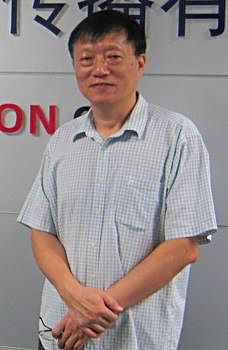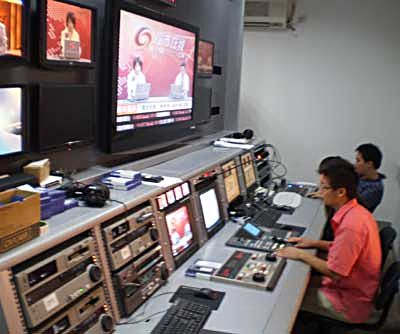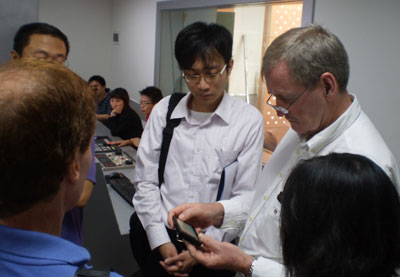
Hu Peng, GM of a unit of First China Financial Group. Photo by Andrew van Buren
MR. HU PENG, General Manager of Shenzhen Huatian Video Program Design Co, a unit of First China Financial Group, is a journalist at heart.
He has also been immersed in the world of finance since he left his hometown of Shenyang in the far northeast of China to take up a position in the far southeastern boomtown of Shenzhen to work as financial controller and director at Shenzhen Television’s (SZTV) Finance Channel.
And beginning in 1996, when he first met Mr. Wang Wenming, Chairman and CEO of First China Financial Group, Mr. Hu formed a professional relationship with the visionary chairman and together refined a shared goal of establishing a media operation that they often liken to “the Bloomberg of China.”
NextInsight and Aries Consulting recently met with Mr. Hu at his newsroom in Shenzhen.
You began your professional career working for Shenzhen Television which is under the vast state-owned media umbrella. How did you transition to a privately-owned news organization and has it been smooth?
Mr. Hu: I had the good fortune to meet Chairman Wang in 1996 when we began a financial program on SZTV at which I served as the financial controller and director. However, we both felt from early on that the 30 minute daily show was too short, especially as people in China became more wealthy and began to take an interest in the stock markets as an investment option.
So eventually, thanks in large part to Chairman Wang’s vision and energy, I left SZTV in 2005 after spending nine years there to produce his new show, Stocks Online (股市在线), which is on uninterrupted Monday through Friday from 8:00 am to 8:00 pm.

The studio of Shenzhen Huatian Video Program Design. Photo by Andrew van Buren
What did you two have in mind for Stocks Online from day one, and where do you see it going over the next decade or so?
Mr Hu: I think its better to tell you where we’ll be in a year or two, because we are growing so quickly and things are changing so fast. Chairman Wang’s goal from the outset was to raise the show’s appeal and professionalism to global financial television broadcast standards, and he wanted to make the website and handset-delivered program as attractive and user friendly as the TV equivalent. To help keep things fresh, we change our two-person presenting team every 40 minutes.
Another aspect which keeps people tuned in to our show, whether seen on TV, cell phones or over the Internet, is the fact that there are no commercial interruptions. Also, our company here (Shenzhen Huatian) is solely focused on Stocks Online, so we remain very committed to its continuous quality improvements.
Your studio produces and broadcasts Stocks Online for consumption via television and the Internet. You mentioned it is also available through cellular service. How is that handled?
Mr Hu: Yes, we do provide handsets that enable subscribers to access our programs, and even buy and sell shares through their enabled cellphones. But our studio doesn’t broadcast the handset-ready show. That’s done at a sister company of ours.

Fund managers at the trip to First China Financial organised by Aries Consulting
Ostensibly, your program is accessible anywhere in the world an Internet connection is available. What about your television broadcast reach?
Mr Hu: We’re growing quickly in terms of our TV coverage. For example, in July we won rights to broadcast via satellite in (the northeastern province of) Liaoning, which now gives us access to some 144 cities. Another of our special value added programs up there called Family Finance (家庭理财) is also doing well.
And we also have spruced up our regular programming, with knowledgeable guests brought into our studio every afternoon, usually from the world of academia. We also have a special segment each Friday afternoon that has panelists discussing and debating the financial and economic events and trends of the times, and serving as a wrap-up of sorts for the week’s stock market performance.
There seem to be so many media engaged in financial news reporting these days. How are you trying to distinguish yourself from the competition?
Mr Hu: The fact that we are accessible on three media: television sets, handsets and laptops… this is indeed unique. And also the enabled handsets we provide subscribers and their buy/sell capabilities can make a mobile shareholder of anyone on the go. Also, we believe we are far more accessible to the masses than the established players in the broadcast media.

A rare breather. Stocks Online is broadcast Monday thru Friday 8 am to 8 pm. Photo by Andrew van Buren
So someone without a college degree and little knowledge of market mechanisms would do well to tune into Stocks Online for tips?
Mr Hu: Indeed. We have to remember that Chinese are big buyers of stocks because there are still not enough investment channels, even with the planned launch of the GEM Board (scheduled for Oct. 1). This country has a lot of money lying around, so rather than having it end up in low interest savings accounts or under mattresses, our show can help educate stock buyers and minimize risk when savers choose to become more active investors.
We are actually targeting the masses, the lower and middle-income citizens and would be shareholders in China with our programs. This allows us to garner a much larger potential audience than our more established peers. A lot of people like us because we use language that is more easily understood. There is arguably less “academic shop-talk” and “industry-insider lingo” in our broadcasts, so a wider viewership is kept tuned in.
This is the information age, and successful enterprises in this brave new world are those media companies that offer two-way information exchanges and interactivity. In what ways can your audience interact with presenters and guests on your programs?
Mr Hu: Another added bonus to our show is that if viewers like what our analysts and presenters are saying, they can ask for guidance and stock picks from that expert, which allows our firm to earn a consulting fee. There are some 100 million owners of company shares in China, and of course among this number are many investors new to the whole business of buying and selling shares.
Most are far from being experts. With more informed shareholders, we feel we are in our own way helping manage risk and help temper volatility in the country’s capital markets.
How successful have you been in getting various television production and broadcast rights in China, a country not exactly known for having a laissez-faire approach to media content? And has Mr. Wang’s politically powerful position as a Shenzhen representative to the legislature in Beijing helped the cause?
Mr Hu: In heavily populated and highly prosperous Guangdong province, only five companies were granted broadcast production licenses, and Mr. Wang was granted one of these. Yes, the media in China can be said to be somewhat tightly controlled, so to get one of these licenses is very impressive. However, we are purely a financial news play so the government doesn’t monitor us and leaves us be.







